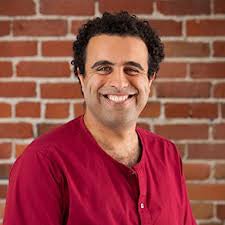SAN FRANCISCO — Looking for a career change, Ken Shimizu decided he wanted to be a software developer, but he didn’t want to go back to college to study computer science.
Instead, he quit his job and spent his savings to enroll at Dev Bootcamp, a new San Francisco school that teaches students how to write software in nine weeks. The $11,000 gamble paid off: A week after he finished the program last summer, he landed an engineering job that paid more than twice his previous salary.
“It’s the best decision I’ve made in my life,” said Shimizu, 24, who worked in marketing and public relations after graduating from the University of California, Berkeley in 2010. “I was really worried about getting a job, and it just happened like that.”
Dev Bootcamp, which calls itself an “apprenticeship on steroids,” is one of a new breed of computer-programming schools that’s proliferating in San Francisco and other U.S. tech hubs. These “hacker boot camps” promise to teach students how to write code in two or three months and help them get hired as web developers, with starting salaries between $80,000 and $100,000, often within days or weeks of graduation.
“We’re focused on extreme employability,” said Shereef Bishay, who co-founded Dev Bootcamp 15 months ago. “Every single skill you learn here, you’ll apply on your first day on the job.”
These intensive training programs are not cheap, charging $10,000 to $15,000 for programs running nine to 12 weeks, and they’re highly selective, typically only admitting 10 to 20 percent of applicants. And they’re called boot camps for a reason. Students can expect to work 80 to 100 hours a week, mostly writing code in teams under the guidance of experienced software developers.
“It’s quite grueling. They push you very hard,” said Eno Compton, 31, who finished Dev Bootcamp in late March. Compton is finishing his doctorate in Japanese literature at Princeton University, but decided he wants to be a software engineer instead of a professor.
“For people who are looking to get involved in software in a big way and don’t want to set aside four years for a computer-science degree, this nine-week program is a terrific alternative,” Compton said.
One San Francisco school, called App Academy, doesn’t charge tuition. Instead, it asks for a 15 percent cut of the student’s first-year salary. Graduates who can’t find jobs don’t have to pay, but so far nearly all of them have.
“When I started it, people thought we were crazy. Why would you do something like that? But in practice it’s worked out well so far,” said Ned Ruggeri, who co-founded App Academy last summer.
Over the past year, more than two dozen computer-coding schools have opened or started recruiting students in cities such as New York, Chicago, Toronto, Washington and Cambridge, Mass. The programs are attracting students from a wide range of backgrounds, from college dropouts to middle-aged career changers. Most students haven’t formally studied computer science, but have tried to learn to code on their own.
Alyssa Ravasio, who graduated from UCLA with a liberal arts degree in 2010, worked at tech startups but was frustrated because she didn’t know how to write software, so she signed up for Dev Bootcamp.
“What we’ve learned in the last nine weeks would have taken at least a year, if not years, on my own,” Ravasio said. “I knew I wanted to learn how to code, and I tried to on my own before, and it was really hard and really frustrating.”
But as more boot camps open, backers worry low-quality programs could hurt the reputation of the pioneer schools and drive away potential students and recruiters.
“I worry about the explosion of Dev Bootcamp copycats,” said Michael Staton, a venture capitalist at Learn Capital. “If they mess up, they kind of ruin it for everybody. Then students have to worry about whether these schools can actually deliver on their promise.”
The coding academies are helping meet the seemingly insatiable demand for computer programmers in the U.S. tech industry, which has been lobbying Congress to issue more visas for engineers and other skilled immigrants.
The boot camps are launching at a time when many recent college graduates are struggling to find jobs that pay enough to chip away at their hefty student loan debts.
The new schools say they are teaching students the real-world skills that employers want but colleges have failed to provide. “Our school is a lot shorter, cheaper and more applicable to the work they’d like to do than universities,” said Shawn Drost, who co-founded Hack Reactor in San Francisco six months ago.
This intensive-learning model can also be used to train workers for other professions for less time and money than what traditional colleges require, Staton said. “We think this is the beginning of a really large movement that will happen across industries,” he said.
Bishay, an Egyptian-born engineer who sold his first software company to Microsoft in 2001, started Dev Bootcamp as an experiment. He wanted to see how quickly he could teach his friend and other non-techies how to write code.
“I used about 10 percent of what I learned in college in my first job, and I figured I could teach that 10 percent in two-and-a-half months,” Bishay said.
Dev Bootcamp has trained about 130 students, and 95 percent of them have been hired as software developers, with an average salary of about $80,000, within a few months of graduation, Bishay said. It’s now opening a campus in Chicago.
The school doesn’t just teach technical skills. It teaches students how to work in teams, communicate better and interview for jobs. On graduation day, it invites tech recruiters to meet students at a “speed-dating” job fair.
“Finding engineering talent is a big challenge right now, and Dev Bootcamp is addressing a really important problem,” said Felicia Curcuru, who was recruiting engineers for FundersClub, a San Francisco company that connects investors with tech startups. “There are not enough people studying computer science.”
 Shereef Bishay is a co-founder of Dev Bootcamp, where computer programming students can expect to work 80 to 100 hours a week.
Shereef Bishay is a co-founder of Dev Bootcamp, where computer programming students can expect to work 80 to 100 hours a week.


















